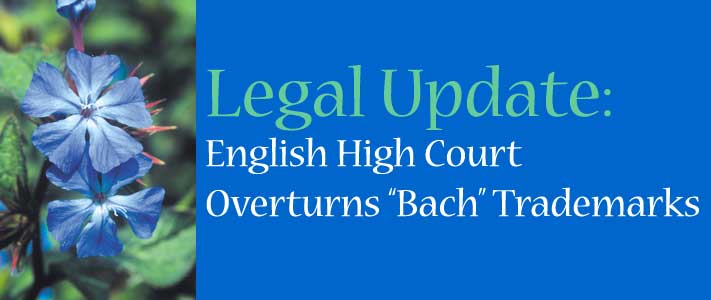|
“Bach” and “Bach
Flower Remedies” are public, generic terms
|
On May 22, 1998, The High Court of England, made
the following ruling in response to a suit brought by Healing Herbs,
Ltd., against Bach Flower Remedies, Ltd, a subsidiary of the A. Nelson
Company:
1. Both the ‘Bach Flower Remedies’ trade marks
should be removed from the register;
2. Both the ‘BACH’ registered trade marks should be removed
from the register;
3. Both the ‘BACH’ trade marks in the signature form can remain
on the register, but only provided the respondent is prepared to agree
to a disclaimer in relation to the word ‘Bach’ itself;
4. Both the roundel device trade marks may remain on the register, provided
the respondent agrees to the disclaimers extending to the word ‘Bach’ as
well as to the words ‘Flower Remedies’.
The case involved an extensive historical review of the development of
the Bach Flower Remedies. In his concluding comments, Mr. Justice Neuberger
wrote for the High Court of England:
“I accept the submission of Mr. Hobbs, on behalf of
the applicant, that the attitude of the individuals running the
Bach Centre over the past fifteen years or so represents a pretty
radical departure from the philosophy of Dr. Bach and, indeed,
the philosophy embraced by his immediate successors, Nora Weeks
and Victor Bullen. It seems to me that their attitude was to
make the Remedies available as widely as possible. While I do
not think that they would have been attracted to the idea of
people “cashing in” on the Remedies, in the sense of
making large profits out of manufacturing and selling them, they
were certainly not concerned with ensuring that the Bach Centre
was seen as the main, let alone the exclusive, source of either
the manufacture or the sale of the Remedies, or that it should
try and prevent other organisations from using the name “Bach”.”
The 119-page court ruling was the result of an eight-day trial, after
a legal suit initiated by Julian Barnard of Healing Herbs, Ltd. Barnard
explained,
“We did not go into this with any intent to damage
the business of the Nelsons Group. We simply wanted to be able to provide
those interested in buying and using the Flower Remedies with a choice,
and the freedom to describe them as what they are.”
The suit was brought by Healing Herbs after a number of educational institutions
in England and around the world were threatened with law suits for offering
classes on the “Bach Flower Remedies” without permission of
the Bach Centre. Legal threats were also made directly to the Healing
Herbs company.
The High Court agreed with the contention that “‘Bach Flower
Remedies’ is a generic term, meaning ‘flower remedies prepared
in accordance with the teachings of Dr Bach’ and… [since they]
can be prepared by anybody; they cannot, in principle, constitute a badge
of origin, that is, an expression indicating a particular source of the
remedies.”
The Nelson Company appealed the ruling. On October 21, 1999, the three
Justices of the Court of Appeal in the Supreme Court of Judicature upheld
the original ruling.
This ruling was then appealed to the British House of Lords, the highest
court of appeal in the UK and the European Court of Justice. Both appeals
were rejected as of July 4, 2000.
In a press release, Julian Barnard commented,
“It is clear now that at last anyone can produce the remedies,
write, teach and work with them, as Dr. Bach desired. It’s the end
of a marathon David-and-Goliath battle and we hope that everyone will
now be free from the constant bully-boy threats of litigation.”
|

![]() and then Add to Home Screen.
and then Add to Home Screen.
